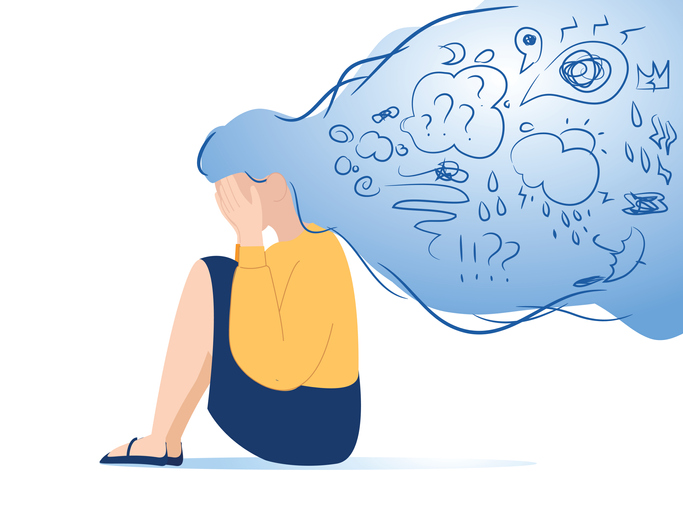Anxiety is an emotion that is expressed naturally by your body in response to stress. This is a feeling of fear or apprehension about the uncertainty of the future or events like the first day at a new job, a test, or a job interview.
This is a healthy feeling at normal levels and helps you stay alert and aware in unknown situations. However, those who are suffering from an anxiety disorder will experience high levels of anxiety. These higher levels can be overwhelming and debilitating because they interfere with the person’s ability to lead a functioning life.
What is an Anxiety Disorder?
Anxiety disorders are mental illnesses that can prevent people from socializing, sleeping, and performing their daily activities. People suffering from an anxiety disorder may feel constant and irrational worry as well as disproportionate fear. This disorder can become uncontrollable, causing serious psychological and physical effects.
Symptoms of Anxiety
The main psychological symptoms of anxiety include:
- Feeling panic and uneasiness for no apparent reason.
- Uncontrollable, irrational feelings of fear and worry that persist for six months or more.
- Difficulty concentrating.
- Multiple failed attempts to resolve your fears.
- Decline in job performance, social activities, relationships, or overall satisfaction with life.
Substance abuse, self-medication, or other compulsive behaviors used to manage anxiety symptoms.
The main physical symptoms of anxiety include:
- Chest pain
- Difficulty sleeping/insomnia
- Heart palpitations
- Shortness of breath
- Rapid breathing
- Trembling
- Choking sensations
- Muscle tension
- Difficulty remaining calm
- Headaches
- Stomach pain
- Fatigue
- Sweating
- Dizziness
- Dry mouth
- Numbness or tingling in hands and feet
- Sweaty or cold hands and feet
What Causes Anxiety Disorders?
It is important to note that anxiety is not a weakness or a personal fault but typically stems from several different causes. Every case of anxiety is different, and there is rarely only one cause. People can develop an anxiety disorder due to several factors, including:
- History of trauma, such as child abuse.
- Family history of anxiety or other types of mental health issues can increase the risk of anxiety.
- Chemical imbalances
- Side effects of certain medications
- Long-lasting stress
- Pre-existing psychiatric disorders make it more likely that you could suffer from an anxiety disorder.
- Substance abuse. Misuse of drugs, alcohol, and prescription medication can cause changes in your brain chemistry which can intensify or cause anxiety.
If you are diagnosed with anxiety, it is essential to understand and identify your anxiety triggers, both the emotional and physical symptoms that indicate the onset of an anxiety episode. This will help you in therapy to develop effective coping strategies.
How Are Anxiety and Addiction-Related?
It is a common occurrence for people who suffer from anxiety to self-medicate or abuse alcohol or drugs to try and cope with their anxiety symptoms. According to the National Institute on Drug Abuse, individuals who suffer from anxiety are two times more likely to suffer from substance abuse than the general population.
Drug and alcohol abuse amplifies the effects of anxiety. This means the person using drugs or alcohol to cope gets stuck in a vicious cycle. First, they use more drugs or alcohol, strengthening both the physical and psychological symptoms of their anxiety, which then causes them to increase their drug or alcohol intake to continue functioning normally.
This cycle leads to developing a tolerance to drugs or alcohol, which ultimately creates a cycle of substance abuse resulting in physical dependency and addiction.
What is a Dual Diagnosis?
A dual diagnosis is a medical term used to describe the existence of a diagnosis of an addictive disorder such as drug addiction with an anxiety disorder or other type of mental illness.
- Common factors of a dual diagnosis of addiction and anxiety where substance misuse triggers anxiety or vice versa include:
Genetic predisposition. Evidence has shown that people who are prone to anxiety may also be more likely to suffer from addiction if there is a family history of both.
- Chemical imbalances. Anxiety and substance use disorders are linked to causing chemical imbalances in the brain. For example, low levels of serotonin are linked to alcoholism and mental illness.
- Self-medicating. Those with an anxiety disorder may turn to alcohol or drugs, attempting to control their psychological and physical symptoms such as drinking before a stressful presentation.
- Substance abuse or withdrawal. Abusing drugs and alcohol can often cause effects similar to the symptoms of anxiety, such as fear or sleeplessness. Withdrawal from alcohol or drugs can also cause anxiety, disturbances in sleep, and restlessness.
Seeking Anxiety and Addiction Treatment for Your or a Loved One?
If you are seeking anxiety and/or addiction treatment for yourself or a loved one, South Hills Recovery Project can help. Please contact South Hills Recovery Project to learn more about your treatment options today.
Dr. Clark completed medical school and psychiatric training at the University of Cincinnati Medical College. He completed the Child and Adolescent Psychiatry Training at Yale Child Study Center. He published several articles on the treatment of addiction and is a member of the American Academy of Addiction Psychiatry. He held a position at Sharon Regional Health Center, Southwood Hospital, and Mercy Hospital Outpatient Clinic. Dr. Clark was a psychiatrist in the United States Air Force in Germany; then he founded the South Hills Recovery Project in 2011 to meet the demands for quality care for those suffering from addiction to opiates. He has successfully treated thousands over patients and helped them regain a good quality of life.
Latest posts by Dr. Clark
(see all)
